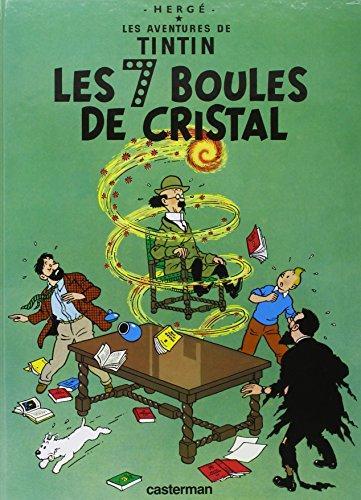62 pages
French language
Published Jan. 26, 1975

62 pages
French language
Published Jan. 26, 1975
The Seven Crystal Balls (French: Les Sept Boules de Cristal) is the thirteenth volume of The Adventures of Tintin, the comics series by Belgian cartoonist Hergé. The story was serialised daily in Le Soir, Belgium's leading francophone newspaper, from December 1943 amidst the German occupation of Belgium during World War II. The story was cancelled abruptly following the Allied liberation in September 1944, when Hergé was blacklisted after being accused of collaborating with the occupying Germans. After he was cleared two years later, the story and its follow-up Prisoners of the Sun were then serialised weekly in the new Tintin magazine from September 1946 to April 1948. The story revolves around the investigations of a young reporter Tintin and his friend Captain Haddock into the abduction of their friend Professor Calculus and its connection to a mysterious illness which has afflicted the members of an archaeological expedition to Peru. The …
The Seven Crystal Balls (French: Les Sept Boules de Cristal) is the thirteenth volume of The Adventures of Tintin, the comics series by Belgian cartoonist Hergé. The story was serialised daily in Le Soir, Belgium's leading francophone newspaper, from December 1943 amidst the German occupation of Belgium during World War II. The story was cancelled abruptly following the Allied liberation in September 1944, when Hergé was blacklisted after being accused of collaborating with the occupying Germans. After he was cleared two years later, the story and its follow-up Prisoners of the Sun were then serialised weekly in the new Tintin magazine from September 1946 to April 1948. The story revolves around the investigations of a young reporter Tintin and his friend Captain Haddock into the abduction of their friend Professor Calculus and its connection to a mysterious illness which has afflicted the members of an archaeological expedition to Peru. The Seven Crystal Balls was a commercial success and was published in book form by Casterman shortly after its conclusion, while the series itself became a defining part of the Franco-Belgian comics tradition. Critics have ranked The Seven Crystal Balls as one of the best Adventures of Tintin, describing it as the most frightening installment in the series. The story was adapted for the 1969 Belvision film Tintin and the Temple of the Sun, the 1991 Ellipse/Nelvana animated series The Adventures of Tintin, the 1992-3 BBC Radio 5 dramatisation of the Adventures, the 1997 video game Prisoners of the Sun, and a 2001 musical in Dutch and French versions.